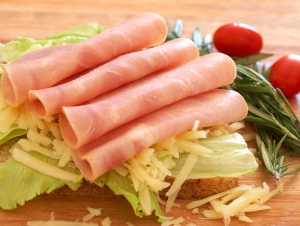Reading scientists keep meat products in the pink with healthy natural preservatives
Release Date 19 February 2013

Food scientists at the University of Reading have begun work on a major project to produce meat additives that can actually lower your risk of cancer - while maintaining the pink colour consumers expect.
The European-funded study aims to develop a way of producing meat products, such as ham, bacon and sausage, without using nitrite, the preservative which has been linked to an increased risk of colon cancer.
Instead, scientists will use natural fruit and vegetable extracts known as phytochemicals to replace the nitrite. As well as helping to preserve the colour, flavour and increase the shelf-life of meat, phytochemicals have the beneficial side effect of helping to improve gut health.
Dr Gunter Kuhnle, from the University of Reading's Department of Food and Nutritional Sciences, will lead Reading's involvement in the PHYTOME project (Phytochemicals to reduce nitrite in meat products) after securing a £431,000 grant.
Dr Kuhnle said: "This is a major project that through its links with food businesses we hope will lead to innovative new food products for consumers in a relatively short period of time.
"Current food additives do a good job at preserving meat in the way consumers demand it - for example, without nitrite, most cooked meat on supermarket shelves would be grey. But through this project we hope we can help develop new ways of preserving meat in a way that is healthier and gives consumers more peace of mind."
Once the new techniques have been developed in the lab, project partners in small businesses in the food industry will recreate the new techniques on a larger scale. The effects of the new products on human health will be tested, and in-depth consumer research will be carried out to find out the reaction of shoppers to the new products.
University of Reading scientists will be involved in analysing different phytochemicals before and after they are added to meat, and will also analyse samples from people taking part in human trials to see how a diet that includes the new meat products might reduce the risk of cancer in the gut.
The project is being led by the University of Maastricht in the Netherlands, with partners in the UK, Belgium, Italy and Greece. The close collaboration of meat processing businesses means that it is expected that the first products will hit the shelves shortly after the project ends in 2016.
ENDS
For more information or to organise interviews, please contact Pete Castle at the University of Reading press office on 0118 378 7391 or p.castle@reading.ac.uk.
Notes to editors
The Department of Food and Nutritional Sciences at the University of Reading is the largest university department of its kind in the UK, combining state of the art teaching facilities, clinical nutrition unit, labs and the largest pilot processing plant in the country. The department has an international reputation for the quality of its research, with themes including dairy, meat products and health, plant-derived bioactive agents, manufacturing food products for health, the gut as a functional ecosystem, and diet, genes and health.
